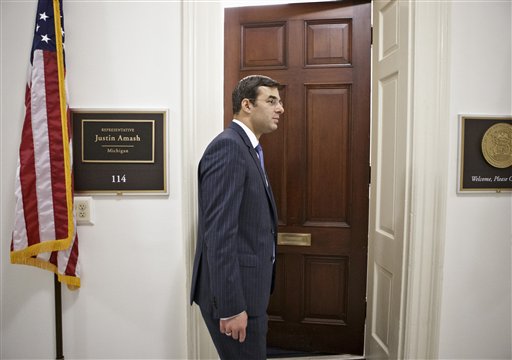 Rep. Justin Amash, R-Mich. returns to his office on Capitol Hill in Washington, Wednesday, July 24, 2013, after a meeting with constituents, before the vote on the Defense spending bill in the House containing his amendment to cut funding to the National Security Agency's program that collects phone records.
Rep. Justin Amash, R-Mich. returns to his office on Capitol Hill in Washington, Wednesday, July 24, 2013, after a meeting with constituents, before the vote on the Defense spending bill in the House containing his amendment to cut funding to the National Security Agency's program that collects phone records.WASHINGTON - The House narrowly rejected a challenge to the National Security Agency's secret collection of hundreds of millions of Americans' phone records Wednesday night after a fierce debate pitting privacy rights against the government's efforts to thwart terrorism.
The vote was 217-205 on an issue that created unusual political coalitions in Washington, with libertarian-leaning conservatives and liberal Democrats pressing for the change against the Obama administration, the Republican establishment and Congress' national security experts.
The showdown vote marked the first chance for lawmakers to take a stand on the secret surveillance program since former NSA systems analyst Edward Snowden leaked classified documents last month that spelled out the monumental scope of the government's activities.
It is unlikely to be the final word on government intrusion to defend the nation and Americans' civil liberties.
"Have 12 years gone by and our memories faded so badly that we forgot what happened on Sept. 11?" Rep. Mike Rogers, R-Mich., chairman of the Intelligence committee, said in pleading with his colleagues to back the program during House debate.
Republican Rep. Justin Amash of Michigan, chief sponsor of the repeal effort, said his aim was to end the indiscriminate collection of Americans' phone records.
His measure, offered as an addition to a $598.3 billion defense spending bill for 2014, would have canceled the statutory authority for the NSA program, ending the agency's ability to collect phone records and metadata under the USA Patriot Act unless it identified an individual under investigation.
The House later voted to pass the overall defense bill, 315-109.
Amash told the House that his effort was to defend the Constitution and "defend the privacy of every American."
The unusual political coalitions were on full display during a spirited but brief House debate.
"Let us not deal in false narratives. Let's deal in facts that will keep Americans safe," said Rep. Michele Bachmann, R-Minn., a member of the Intelligence committee who implored her colleagues to back a program that she argued was vital in combatting terrorism.
But Rep. Jim Sensenbrenner, R-Wis., a senior member of the Judiciary Committee who helped write the Patriot Act, insisted "the time has come" to stop the collection of phone records.
Several Republicans acknowledged the difficulty in balancing civil liberties against national security, but expressed suspicion about the Obama administration's implementation of the NSA programs - and anger at Director of National Intelligence James Clapper.
"Right now the balancing is being done by people we do not know. People who lied to this body," said Rep. Mick Mulvaney, R-S.C.
